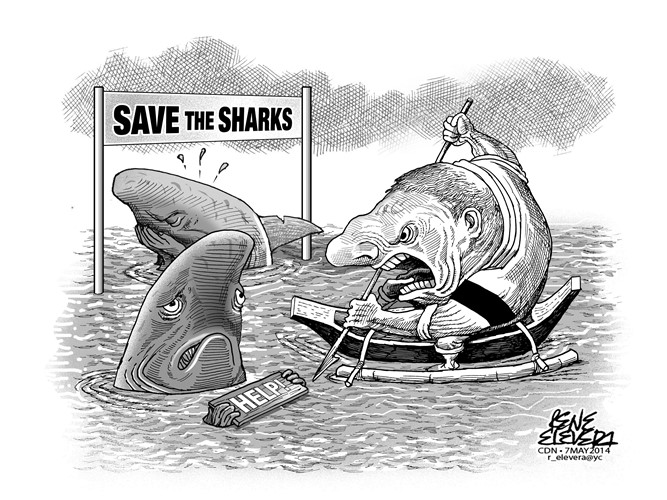It is a sad day when the hook gets pulled on sharks, predators of the sea, and they turn into victims of human greed and ignorance.
Our fisherfolk continue to hunt and sell endangered species like thresher and hammerhead sharks because there is a demand for these sea creatures and because of failures in coastal law enforcement and communication.
Would fishers in Daanbantayan town risk catching and selling these sharks if they knew they were more valuable alive to promote Malapascua as a dive destination and to keep the marine ecosystem in balance?
Would vendors in Talisay city ask if it is illegal to sell thresher shark meat if they were well informed of the Cebu provincial ordinance protecting these vulnerable sea vertebrates?
Would they risk doing something that could land them in jail and subject them to a fine of P5,000?
They would, especially if the violation goes unpunished because the eyes of the government’s sea watchers are not where they should be.
Cebu’s legislature is considering amendments to the Provincial Fisheries and Aquatic Act of 2012 to protect more species.
But beyond including the hammerhead shark and brown seaweed in its list of protected marine life, the Cebu Provincial Board must take steps as part of its oversight function to plug holes in implementing and communicating the ordinance.
They can check how often Bantay Dagat (Sea Watch) patrols operate in municipal waters and inspect fishers’ catch.
Last week, a fishing boat in Malapascua using the illegal “hulbot-hulbot” or zipper fishing net method was apprehended and its owner was identified as a barangay official in Bantayan island.
Public officials who take part in illegal fishing or collude with these operators must be prosecuted and jailed. A firm example must be made to show that crimes of the sea do not pay.
The Internet has surfaced photos of shark carcasses being sold in public markets and areas. All it takes is dedicated follow-up to find how and why the activity continues in both urban and rural coastal communities.
We view these revelations as a hopeful sign.
If concerned citizens can be proactive and immediately share evidence of an illegal catch, it will be easier to go after the perpetrators.
With education and information, consumers and fishers can move beyond commodifying these creatures.
Websites like that of the Discovery Channel, which lists “20 Ways Sharks Help Humans” show the value of sharks from protecting shellfish, to cleaning oceans and providing inspiration for technology.
The threat of penalties has a limited effect. Appreciating the role of sharks in the ecosystem and Cebu tourism will make it easier for people to value and care for them.
Disclaimer: The comments uploaded on this site do not necessarily represent or reflect the views of management and owner of Cebudailynews. We reserve the right to exclude comments that we deem to be inconsistent with our editorial standards.

